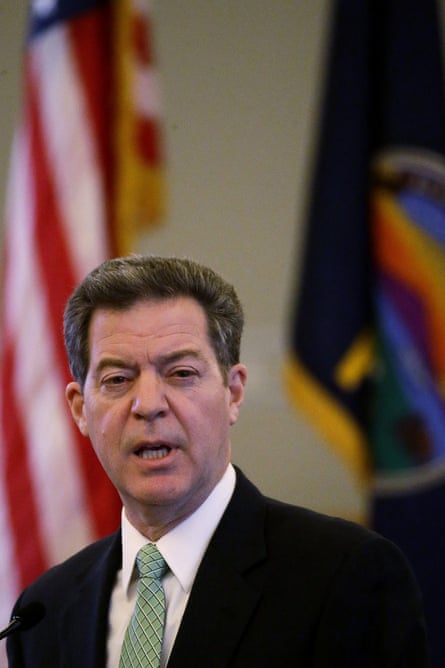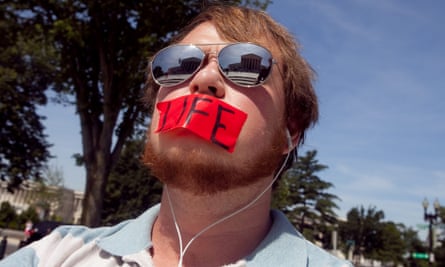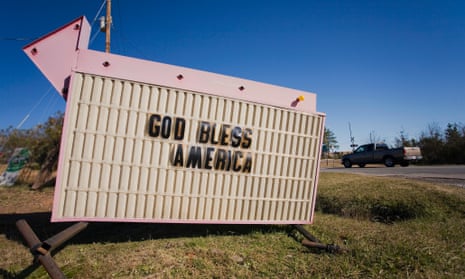In a hypothetical Venn diagram, one circle representing extremist Christians and the other fundamentalist capitalists, the lens-shaped overlap contains Sam Brownback, the newly re-elected governor of Kansas. It also includes a broad spectrum of citizens who have supported him: working-class members of the Tea Party, wealthy members of C Street, a middle-class college student who once handed me an essay on zero-sum economics while wearing a T-shirt that read: “pro-life, pro-God, pro-gun.”
Governor Brownback, in his state of the state address, said: “Kansas is the most pro-life state in America. And we are not going back.” Kansas is also $280m short on due payments for this fiscal year, following an experiment with historic tax cuts now in its fourth year. The projected shortfall for next year is nearly $650m. On this point, too, Brownback is not going back: “We will continue our march to zero income taxes.” Indeed, while his administration recently called for slowing deep tax cuts, lofty supply-side goals remain.
This ideological juxtaposition, in which subjective morality is controlled by the state and in which citizens’ objective needs are left for the market to sort out, is by now familiar to most voters. But its most poignant setting, perhaps, was the main focus of Browback’s speech: public education.

Last year I reported for Harper’s and Guernica on fever-pitch attempts in Kansas to erode both the funding of public schools and the separation of church and state within them. Last March, partially settling a historic, 15-year, multiple-lawsuit battle pitting Kansas schools against Congress, the state supreme court set a national precedent by ruling with Gannon v Kansas that the state inequitably funds public education – the “suitable provision” for which the state constitution has required since a 1960s amendment. Last month, a district court ruling all but sealed the deal.
In 2013, not long after successfully restoring rigorous science standards infamously undone by school board creationists during the previous decade, Kansas quietly became the fifth state, following Texas, Florida, Arkansas and Oklahoma, to pass controversial civics education legislation creating what some view as legal wiggle room for teaching US history with a religious slant.
While de-funding and de-secularizing both amount to aggression toward the public school as we know it, the finance issue was more pressing and the stuff of national news. School districts in other states have brought similar lawsuits summoning constitutional language to demand increased funding and awaited the Kansas ruling as a legal guidepost. Once the state court sided with schools, the nation had an example – but Kansas still had the governor who helped create its current budget mess.
The ruling came down in an election year, just as economists were pronouncing Brownback’s experiment a failure, and the Democratic underdog gave Brownback a run for his money – but it was big money. Brownback is famously backed by the Koch brothers, the Wichita-based billionaires. Republicans in the statehouse and the general populace crossed lines to remove Brownback, but he managed a win by a margin not much larger than the number of voters thwarted at the polls by new voter-ID laws.
What to do, then, for the re-elected executive administration, ordered by the judicial branch to increase education spending but facing revenue shortfalls created by tax cuts?
With a state budget plan outlined last week, Brownback aims to preserve his existing income tax slashes that drastically lowered top rates and made nearly 200,000 business owners exempt, and to triple the state cigarette tax from 79 cents to $2.29 per pack. Smoking rates being far higher among the poor, it’s a move difficult to reconcile with Brownback’s statement that society does best “when our hearts are tender to what God is tender to – the poor, the voiceless, the powerless.”
For a more sustainable solution to the education funding problem, Brownback has called repeatedly for the legislature to rewrite the state’s school-finance formula altogether.
While pundits are busy evaluating such games of economic chess, it might be useful to examine the seat from which Brownback decides his next move: that ancient place where the religious and the greedy mingle. Today, the religious right and wealthy free-marketeers both long to privatize a system that educates 50 million students, but for different reasons. One wants to make 50 million Christians; the other, 50 million paying customers.
Rob Boston, communications director for Americans United for Separation of Church and State, first noticed the contemporary allegiance between extreme capitalists and religious zealots years ago while lurking at religious right conferences. The unholy union, he told me by phone from his Washington office, begins with the money holders.
“They look at the shock troops of the religious right, and they think, ‘How can we tap into that power? How can we get them to endorse our agenda of privatization?” Boston theorized. In matters of public education, which the religious right finds distasteful along moral lines, “they’re already more than halfway there.”

But campaign-funding behemoths like the Koch family have little interest in morality. Often ostensibly secular and radically libertarian, for decades they have lobbied to turn public education – currently an $85bn federal operation – into an industrial complex. “There are privatization groups that salivate at the thought of getting that money out of the public sector and into the private sector,” Boston added.
As for fundamentalist Christian grievances with the school system – perceived as godless and unfriendly to their evangelical cause – Boston pointed out the “incredible mission field” that would be America’s public school students. He often reports on complaints across the country of grassroots troops passing out Bibles on school grounds or hosting Christian rock bands at school assemblies.
But after decades of such small victories, Boston said, having failed to remake public schools as “little fundamentalist academies”, those extremist factions are now more interested in siphoning students into private Christian schools. That’s another pipe dream, it would seem – more than a decade into the country’s private school voucher system, polls show vast support for maintaining the public system, especially among the lower and middle classes for whom it is the most economically viable schooling option: 90% of American kids go to public schools, and for the first time in half a century, more than half of them live in poverty.
“You rarely hear these people talk about Jesus anymore,” said Boston, who despite his cynical tone possesses the incredulity only a true optimist could sustain. “They instead talk about Ronald Reagan and free markets and how much they hate Obamacare.”
Decrying budget deficits rather than moral deficits is an act of desperation among Christian extremists, Boston postulated. They’re mostly old, white, male fundamentalists who look at the country’s shifting demographics, where gay people will go on marrying and brown people will go on presidenting. So, in lieu of values-based resonance, they adopt the far right’s economic talking points and, Boston said, “slap a little bit of Christian veneer on it”.
It’s a veneer that reverend Jeff Gannon, a Wichita pastor and the eponymous plaintiff of the recent Gannon v Kansas, can smell from the pulpit.

“The religious community are allowing a particular ideology, value system and perspective to speak for the whole of those who claim to be persons of faith,” Gannon told me the day of the supreme court’s decision last year. “I’m a person of faith. I’m a religious leader. How dare you say that people of faith believe a particular way about this? Unfortunately that’s how many have perceived the religious community to be involved, to advocate for privatizing education and the redirecting of funds through vouchers.”
It was a good legal strategy that a longtime Christian clergyman became the namesake for Gannon v Kansas, a lawsuit bent on increasing funding for a secular institution. In Brown v Board some 60 years ago, Topeka dad Oliver Brown took the title spot for being the only male plaintiff among 13 parents, and by the time the ruling came down he was an active minister. The two cases contain plenty more parallels, and if there was a poor people’s movement to match the civil rights movement of the mid-20th century today, people would be marching in the streets – not to desegregate schools but to keep them open.
“Justice is, in the Hebrew scriptures of the Bible, defined as when you’re an advocate for a person who cannot be an advocate for themselves. In this case, see, it’s about justice – because we have children who cannot speak for themselves,” said Gannon, who comes at the issue as both a clergyman and a dad. “My involvement is not just a religious issue. Equally important is this idea that we’re shaping young lives, who will ultimately be our leaders. And they’re watching us very carefully for what we do, what we say, how we perceive when it comes to education.”
Gannon and his wife went to public schools, and chose to send their two children to the diverse Wichita school district, rather than to a private academy or to suburban district more flush with local cash. He said that was the heart of this year’s game-changing school-finance win – to ensure equal education opportunities for disadvantaged populations at a moment when the richest Kansans want to redirect funds from public to private education. It’s why they offered their children’s names among the lawsuit plaintiffs.
“They were involved in that decision, and they totally concur with the idea that this is about the common good,” he said. “Unfortunately we are living in a climate in Kansas where serving the common good is not the predominant viewpoint.”
The dollar bill itself, in fact, agrees with Gannon, not with modern-day Kansas. On the left, a circle containing a pyramid with an eye represents providence in our nation’s founding; on the right, the flip side of the round US seal reads, “E Pluribus Unum” – “out of many, one.” We might interpret it to mean we’re all in this together; every state, every individual, is part of a united operation built from 13 colonies with a vision. Nearby juxtaposition of the line “In God we trust”, though, is the source of many American conundrums. We’ll operate as a democracy, this symbolic configuration hints, yet some force of divinity will animate us.
Brownback ended his state of the state address on that note: “May God grant us all grace, mercy and truth to carry out our duties.” If there is a God, and it loves every child – the poor child, the Muslim child, the child without a church – its ways never have been more mysterious, to some, than meager state education budgets signed by well-heeled Christian governors.

Comments (…)
Sign in or create your Guardian account to join the discussion